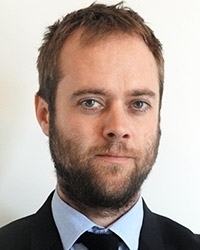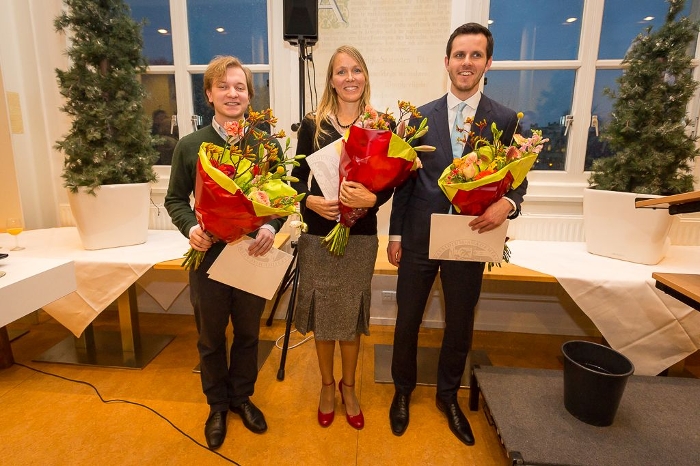
Welmoet Wels wins the faculty Jongbloed thesisprize 2015
The world is full of wars, and no war is without its dead. What happens to the bodies of fatal casualties of armed conflict? The winner of the faculty Jongbloed Thesis Prize 2015 is Welmoet Wels (Public International Law). Her thesis Dead body management in armed conflict: paradoxes in trying to do justice to the dead looks at the management of the dead of armed conflict from the perspective of international law.
What rights do fatal casualties have?
The thesis starts with an analysis of how legislation on the war dead developed under international humanitarian law. This legislation is founded on the basic principles of integrity of the dead human body, the importance of identification, the necessity to share information on identity and a respectful burial. These principles and the fundamental rules arising from them demonstrate the existence of a general duty of care for the dead in times of war. Practical handbooks about clearing (mass) corpses in times of a disaster, including armed conflict, aim at finding a solution that is as respectful as possible, but apart from this establish no clear links to the laws of war. Also international criminal law and international human rights have an uneasy relationship with legislation on the dead established under international humanitarian law, but are also somewhat at odds with each other on the topic of care for the dead. Exhuming bodies of people who have died in war for the benefit of international criminal investigation reduces the dead to corpus delicti for the duration of the criminal proceedings; human rights, however, prescribe that family members are entitled to know what happened to their loved ones, and a swift identification and the return of the body to the family is an essential part of this process. The thesis concludes with the question: what lies behind the basic principles of integrity and respect for the deceased? Is it possible to deduce from the obligations on the management of the war dead and in particular the underlying principles of integrity and respect, that these deceased persons have rights?
Recommendations for future research
Further research on the status of the war dead under international law would help to answer these questions and provide more insight into the exact extent of the obligation of care for the deceased under international humanitarian law. Responsibility and accountability for non-observance of these obligations also require further consideration; can non-observance or conscious violation of these regulations be considered a war crime? Subsequent research could help to reduce the tensions and paradoxes that exist with regard to care for the war dead between the various fields of law, and in this way contribute to doing justice to the dead – of armed conflicts.

Supervisor Dr. Eric De Brabandere
“The thesis is an excellent piece of work on a subject that has received little attention up till now: how international law deals with the fatal casualties of armed conflict. The thesis has a logical structure, puts forward well-founded arguments, and is mainly based on research from primary sources. Ms. Wels’ approach was based on a general vision on international law, whereby the various subareas of international law which can be significant in this issue – human rights, humanitarian law, general international law – are dealt with and are studied thoroughly.” Dr. Eric De Brabandere – Associate Professor of International Law.

Welmoet Wels, right: Joost Luiten.
The three winning theses 2015
- Welmoet Wels: Dead body management in armed conflict: paradoxes in trying to do justice to the dead. Thesis supervisor: Dr. E.P.C.D.C. de Brabandere
- Willem Rijnenberg: De tweede volzin van artikel 7:55 BW [The second full sentence of Article 7:55 Dutch Civil Code]. Thesis supervisor: Prof. E. Koops
- Joost Luiten: Investeren in Procederen. De plaats van Third Party Litigation Funding in het Nederlands recht. [Investing in Litigation. The place of Third Party Litigation Funding in Dutch law]. Thesis supervisor: Prof. W.H. van Boom
Previous winners
2013-2014 Coen Vernooij (Levenslang en de strafrechter: Een onderzoek naar de invloed van het Nederlandse gratiebeleid op de oplegging van de levenslange gevangenisstraf door de strafrechter)
2012-2013 Ruben de Graaff (Something old, something new, something borrowed, something blue?)
2011-2012 Victor Bouman (De baai geblokkeerd: Piraten in het nauw?)
2010-2011 O.C.J. Klaver (Gegarandeerde kwaliteit? De toepassing van het depositogarantiestelsel op de notariële kwaliteitsrekening)
2009-2010 Iryna Levdokymova (The EU-US SWIFT Agreement: Which Fate under the Lisbon Data Protection Framework)
2008-2009 Lisette Valk (CVA-Ketenzorg: medische of juridische kopzorg)
2007-2008 Peter van Schijndel (Identiteitsdiefstal)
2006-2007 Sander David Dikker Hupkes (What Constitutes Occupation? Israel as the occupying power in the Gaza Strip after the Disengagement)
2005-2006 Erik Kok (A membership approach. The legal status and loss of protection of members of non-governmental armed groups under the law of non-international armed conflict)
2004-2005 Kasper Jochem Olivier Jansen (Kennis van de Laedens als vereiste voor onrechtmatigheid)
2003-2004 Dianne Johanna Maria Beurskens (Wederzijdse bijstand volgens Napels II)
2002-2003 Nadia Djebali (Procedures ter beslechting van interstatelijke verrekenprijsgeschillen)
2001-2002 Felix Benjamin Ronkes Agerbeek (Zeg ik dat goed? EU-ambtenaren en hun vrijheid van meningsuiting)
2000-2001 Karlijn Teuben (Rechterlijke afspraken als “Recht in de zin van art.99 wet RO)
1999-2000 P.M. Waszink (Judicial Activism)
1998-1999 H.J.T.M. Roosmalen (The King can do no wrong)
1997-1998 T.C. Leemans (Uitvinding in dienstbetrekking)
1996-1997 Johannes Jacobus Catharinus van de Graaff (Defiscalisering van de Algemene Bijstandswet)
1995-1996 Jacob Hendrik van der Winden (Ik voel me alleen! Zij zijn machtig en met velen. Geen vrijplaats voor folteraars? Het universaliteitsbeginsel in het internationale recht)
1994-1995 Pauline Laan (Algemene voorwaarden in het handelsverkeer)
